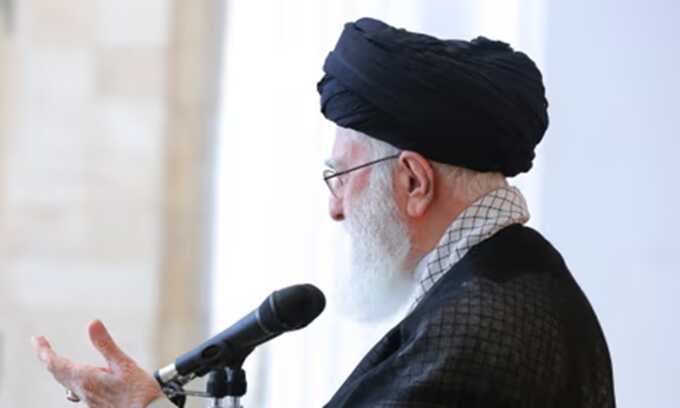Iran’s Ali Khamenei vows Hezbollah and Hamas will not back down
In rare public address, supreme leader defends missile attack on Israel and makes appeal for Muslim unity
Iran’s supreme leader, Ayatollah Ali Khamenei, has vowed that Hezbollah in Lebanon and Hamas in Gaza will emerge with new leaders and not back down, after a wave of Israeli strikes that have killed the groups’ senior figures.
In a sermon at Friday prayers in Tehran in front of tens of thousands – a rare public address – Khamenei defended the ballistic missile attack on Israel this week that Iran has said was in retaliation for the deaths of the Hezbollah secretary general Hassan Nasrallah and the Hamas political leader Ismail Haniyeh.
He said “the brilliant action of our armed forces a couple of nights ago was completely legal and legitimate”, and in line with the Qur’an, Iran’s constitution and international law. He said any nation had the right to defend its soil and its interests in the face of aggressors.
Iran fired more than 180 missiles at Israel, most of which were intercepted, though some landed on or around military bases. Israel has said it will respond.
Khamenei, speaking predominantly in Arabic but also in Farsi, urged places from “Afghanistan to Yemen and from Iran to Gaza and Yemen” to be ready to take action, and praised those who had died doing so. “The resistance in the region will not back down with these martyrdoms, and will win,” he said, calling for the belt of Muslim unity to be tightened.
It was the first time the 85-year-old supreme leader had led Friday prayers since the US killed the Islamic Revolutionary Guards Corps leader Qassem Suleimani in Baghdad in January 2020.
The Iranian leadership aimed to show through the size of the crowd attending the Grand Mosque that ordinary Iranians supported the leadership’s decision to attack Israel over the killings of its two allies and the Iranian Revolutionary Guard brigadier general Abbas Nilforoushan.
Iran’s elected president, Masoud Pezeshkian, who campaigned as a reformist who wanted better ties with the west, described the collective prayers attended in the front rows by senior military, clerics and politicians as a show of unity and power.
Despite Khamenei’s appeal for Muslim unity, the speech made little effort to build unity with moderate Arab leaders, instead praising the Hamas attack on 7 October last year in which 1,200 people were killed and that triggered the Gaza war as a “legitimate act” and insisting the root of the region’s problems lay solely in foreign interference and the actions of Israel.
He did little to prepare Iranians for an imminent Israeli attack or for what Iran would do in response. He said: “We need not procrastinate nor rush, but to do what is logical and correct.”
Khamenei said the policy of hegemonic powers and aggressors was to sow discord, but he claimed Muslim nations had been awakened to the fact that Palestinians, Lebanese, Iraqis, Egyptians, Syrians and Yemenis were facing a common enemy with a single command centre.
Listing many militia leaders who had been assassinated, he said: “Each of these were considered pillars of the revolution at the national or local level, and their loss was not an easy thing. But the revolution didn’t stop, didn’t retreat, but accelerated.”
He said Israel’s only achievement after spending billions of dollars in Gaza and Lebanon had been the destruction of schools and a new questioning of Israel’s ability to exist.
The Israeli prime minister, Benjamin Netanyahu, this week made what he called a direct appeal to ordinary Iranians to rise up and overthrow their leadership. He argued that if the regime truly cared about their future it would stop wasting billions of dollars on futile wars across the Middle East and spend more on public services.
He laced his appeal with a warning that there was nowhere in the Middle East that Israel could not reach.
The aim of the Iranian officials, by contrast, was to underline that Iranians feel inextricably intertwined with resistance to Israel in Gaza and Lebanon, and are even willing to sacrifice their lives if a war breaks out.
At a meeting on Thursday in Doha, Gulf state leaders insisted they would not support a US attack on Iran but remain neutral.
Linking the fate of Iran so closely with the Palestinian resistance carries risks since Iran’s economy remains racked by 31% inflation, low growth and reduced living standards. Iranian defence spending is about 2.9% of GDP.
Read more similar news:
Comments:
comments powered by Disqus


































